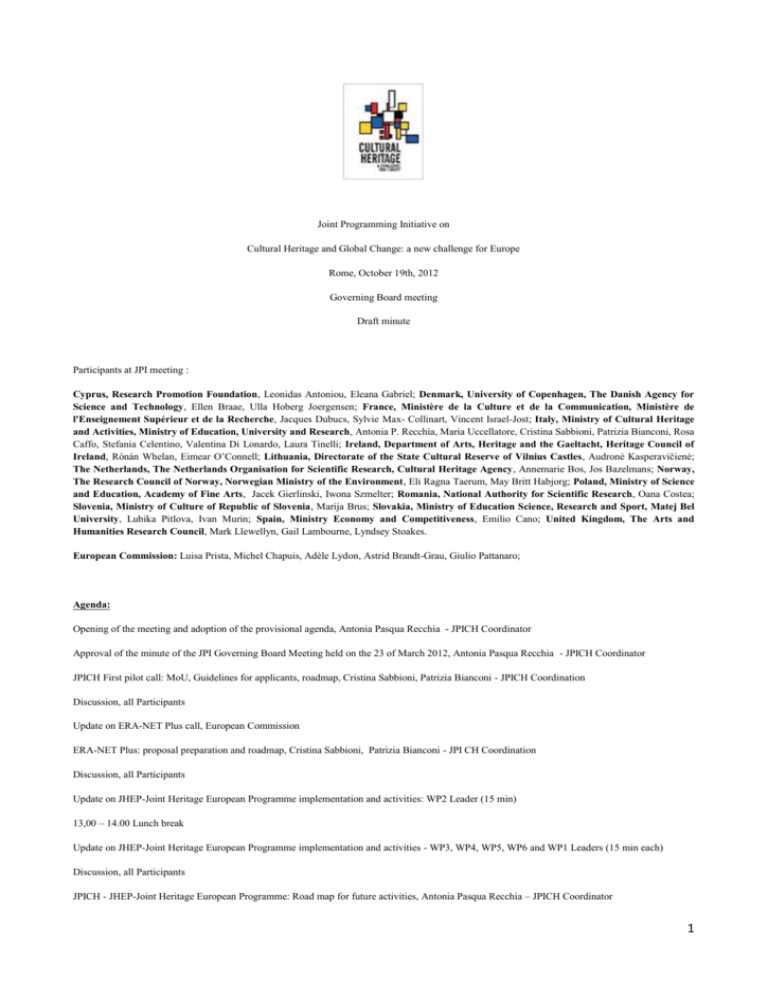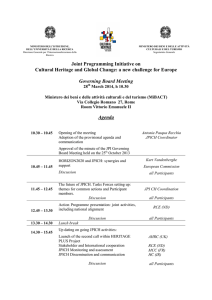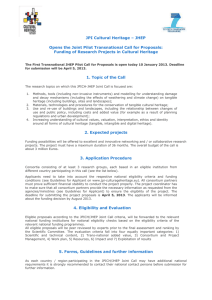Rome, October 19th, 2012 - JPI on Cultural Heritage and global
advertisement

Joint Programming Initiative on Cultural Heritage and Global Change: a new challenge for Europe Rome, October 19th, 2012 Governing Board meeting Draft minute Participants at JPI meeting : Cyprus, Research Promotion Foundation, Leonidas Antoniou, Eleana Gabriel; Denmark, University of Copenhagen, The Danish Agency for Science and Technology, Ellen Braae, Ulla Hoberg Joergensen; France, Ministère de la Culture et de la Communication, Ministère de l'Enseignement Supérieur et de la Recherche, Jacques Dubucs, Sylvie Max- Collinart, Vincent Israel-Jost; Italy, Ministry of Cultural Heritage and Activities, Ministry of Education, University and Research, Antonia P. Recchia, Maria Uccellatore, Cristina Sabbioni, Patrizia Bianconi, Rosa Caffo, Stefania Celentino, Valentina Di Lonardo, Laura Tinelli; Ireland, Department of Arts, Heritage and the Gaeltacht, Heritage Council of Ireland, Rónán Whelan, Eimear O’Connell; Lithuania, Directorate of the State Cultural Reserve of Vilnius Castles, Audronė Kasperavičienė; The Netherlands, The Netherlands Organisation for Scientific Research, Cultural Heritage Agency, Annemarie Bos, Jos Bazelmans; Norway, The Research Council of Norway, Norwegian Ministry of the Environment, Eli Ragna Taerum, May Britt Habjorg; Poland, Ministry of Science and Education, Academy of Fine Arts, Jacek Gierlinski, Iwona Szmelter; Romania, National Authority for Scientific Research, Oana Costea; Slovenia, Ministry of Culture of Republic of Slovenia, Marija Brus; Slovakia, Ministry of Education Science, Research and Sport, Matej Bel University, Lubika Pitlova, Ivan Murin; Spain, Ministry Economy and Competitiveness, Emilio Cano; United Kingdom, The Arts and Humanities Research Council, Mark Llewellyn, Gail Lambourne, Lyndsey Stoakes. European Commission: Luisa Prista, Michel Chapuis, Adèle Lydon, Astrid Brandt-Grau, Giulio Pattanaro; Agenda: Opening of the meeting and adoption of the provisional agenda, Antonia Pasqua Recchia - JPICH Coordinator Approval of the minute of the JPI Governing Board Meeting held on the 23 of March 2012, Antonia Pasqua Recchia - JPICH Coordinator JPICH First pilot call: MoU, Guidelines for applicants, roadmap, Cristina Sabbioni, Patrizia Bianconi - JPICH Coordination Discussion, all Participants Update on ERA-NET Plus call, European Commission ERA-NET Plus: proposal preparation and roadmap, Cristina Sabbioni, Patrizia Bianconi - JPI CH Coordination Discussion, all Participants Update on JHEP-Joint Heritage European Programme implementation and activities: WP2 Leader (15 min) 13,00 – 14.00 Lunch break Update on JHEP-Joint Heritage European Programme implementation and activities - WP3, WP4, WP5, WP6 and WP1 Leaders (15 min each) Discussion, all Participants JPICH - JHEP-Joint Heritage European Programme: Road map for future activities, Antonia Pasqua Recchia – JPICH Coordinator 1 JPICH evaluation: GPC Meeting, Maria Uccellatore – GPC member (MiUR) Discussion, all Participants 17.00 End of the meeting Minute: On October 19th 2012, the 7th Governing Board meeting for the Joint Programming Initiative on Cultural Heritage and Global Change: a new challenge for Europe (JPICH) was held in Rome (Italy), at the Ministry of Cultural Heritage and Activities, via del Collegio Romano, 27. Opening and welcome address: Antonia P. Recchia, welcomes the participants and a round table presentation follows. Adoption of the provisional agenda The Governing Board (GB) Members approve the meeting agenda Approval of the minute of the JPI Governing Board Meeting held on 23rd of March 2012 The Governing Board (GB) members approve the meeting minute. JPICH First pilot call: MoU, Guidelines for applicants, roadmap Follows a discussion on the MoU revised by the JHEP Steering Committee on October, 18th and the following additional amendments are agreed. Article 1 no comments were added Article 2, paragraph 4: it is going to be moved to Article 7 Article 2, paragraph 5: the following sentence will constitute this paragraph: “Each Signatory will designate a contact person”. Article 3, paragraph 3. It is discussed about the minimum number of research groups which may apply for the proposal. The Governing Board is asked to vote on a minimum of two or three. The majority votes for a minimum of three. The paragraph which follows is moved to article 7. Article 3, paragraph 2: Mrs Brae (Denmark) suggests to include artifacts in art 3 2nd paragraph among the terms buildings, landscapes. Gail Lambourne (UK) states that the terms tangible, intangible and digital already include all these issues, so she suggests that any other term isn’t included. Article 3, paragraph 4: the paragraph which follows will be moved to article 7. Article 4- It is decided not to specify the deadline in the MoU. It is set to be anyway confirmed on November 15th. Article 5- In order to avoid conflict of interest, the bodies which cannot apply to this call will be better specified in the text of the MoU, that is Steering Committee Members, Executive Board and Governing Board Members, and others directly involved in the assessment process. Article 6 -The Governing Board is required to discuss different options regarding the composition of the Scientific Evaluation Committee including: SEC= 3 Members of Scientific Committee + Independent experts appointed by the Signatories through transparent procedure; JPI Scientific Committee which is an already existing body in JPI. It is decided that the rewording of this paragraph can be following: “The assessment of proposals will be undertaken by the Scientific Committee supplemented, if necessary, by other experts chosen by the Scientific Committee from a new list of independent international experts proposed by JPI Participants. The expertise of the Scientific Committee will, therefore, cover all fields of research addressed in the call”. Article 7- paragraph 1: it will be integrated with article 2, paragraph 4. Some paragraphs of the other articles will be moved here because of specific funding requirements included in them. The MoU containing the above mentioned amendments and the English grammar revision is going to be sent to all partners for signature by November, 15th. Follows a discussion on two points of the Guideline for Applicants: the minimum and maximum value of project budget. The Governing Board is then asked to express the minimum and maximum budget each Country shall invest for each proposal and, in addition, which instrument is likely to be funded whether networking and collaborative research. 2 Mark Llewellyn (United Kingdom) suggests that the instrument to be financed should be discussed first. The Governing Board is asked to express a preference between networking and cooperation research projects. UK: networking projects PL: both ES: both DK: networking projects Norway: networking projects The Netherlands: networking and small pilot projects IE: networking projects F: networking projects CY: research activity Slovenia: both Slovakia: networking projects Italy: both Lithuania: networking projects The Governing Board decides not to mention a minimum and maximum budget in the Guide for Applicants, paragraph 2.4. The Governing Board decides not to mention the two different instruments (networking and cooperation research projects) in paragraph 2.7 of the Guide for Applicants but it will be specified in Annex 1- Funding Program following the rules of a single country. Comments on the Guide for Applicants already sent to all Governing Board members are requested by October, 30th. The Road map for the launch of the first Pilot Call will be presented within JHEP WP3. Update on JHEP-Joint Heritage European Programme implementation and activities: Gail Lambourne, (UK) An update on WP2 activities performed so far follows. A brief overview of the objectives, tasks and timelines of the different deliverables in this WP is made. Reminder to the Governing Board on the process so far, creation of experts group and development of common framework, achievement of task 2.1 and 2.2 and work in progress for tasks 2.3 and 2.4. Lunch break 14.00 Afternoon session Road map fist pilot call, Cristina Sabbioni (Coordination Structure) Cristina Sabbioni (Coordination Structure) presents the road map for the first Pilot Call as follows: by November 15th the second draft of the Guideline for Participants is going to circulate, by November 30th Participants are requested to send the amendments to the Coordinator (including National Sheet for funding rules), by December 15th the Coordinator will circulate the final text of the Guideline for Applicants to the participants for approval; the organization of a video conference with Pilot Call Participants for Guidelines approval will follow. By December 31th a testing for web site submission is going to take place. On January 10th 2013 the Pilot Call will be finally launched. Update on ERA-NET Plus call, Michel Chapuis (European Commission) European Commission updates on ERA-NET Plus Call. European Commission is going to set up a panel of experts in the field of Cultural Heritage for the call evaluation in March-April 2013. The Commission has at the moment no further information to give. Cristina Sabbioni (Coordination Structure) asks for confirmation that in defining the topics on which this ERA-NET Plus proposal will be launched, we may refer to the SRA mentioning the 4 broad area of research on which this JPI will be developed. Michel Chapuis (European Commission) agrees on focusing more on tangible heritage but specifies that this has not to be made exclusively. Despite the fact that the call text mentions tangible heritage, the concept is however to be extended to intangible and digital; it is mentioned in the text of the call. Making reference to the SRA and mentioning it is accepted by the Commission. The discussion focuses then on two major issues: topics and financial mode (how EC contribution is going to be distributed) For what concerns topics, the four priority areas identified in the SRA are proposed as the starting point for ERA-NET Plus proposals: 3 Developing a reflective society (Recognition) Connecting people with heritage (Access) Creating knowledge (Interpretation) Safeguarding the cultural heritage resource (Protection) Sylvie Collinart (France) considers that the proposed topics cover perfectly the issues raised by France regarding the request of intangible cultural heritage to be visible in the ERA-NET proposal. The mobilisation of efforts and funding should reflect that tangible heritage is the main focus not excluding the other two, i.e digital and intangible. Tangible is the main issue of the call and intangible and digital have to be integrated. The synergy need to be well explained; that is the message coming from the Commission. It is agreed that the starting point for ERA-NET Plus proposal will be the work performed by SRA starting from the 4 priority. EC Funding mode: It is then discussed about how the 33% funding given by Commission is intended to be managed in case the proposal passes. Countries can decide: i) to use EC funding as real common pot, following the ranking list; ii) to divide the EC funding proportionally depending on single national funding; iii) to use the mixed mode, that is part as real common pot and part proportionally divided. The mixed mode seems to be the most feasible on a general agreement. For the ERA-NET proposal the Coordinator needs an official letter of agreement on behalf of the organisation which is going to fund the second JPICH/JHEP call, declaring the amount of money which is going to be funded. ERA-NET Plus: proposal preparation and roadmap, Cristina Sabbioni (Coordination Structure) Cristina Sabbioni (Coordination Structure) shows the road map of the ERA-Net plus proposal as follows: A participant description(following the sent template) is needed to be sent to the Coordinator by November, 30th The Coordinator will send the Proposal structure to the participants by December, 15th The Proposal draft 1is going to circulate by January, 15th A WP Leader Meeting (videoconference) is going to take place on January, 30th The second Proposal draft 2 is going to circulate by February, 15th, and finally the proposal submission will be made on February, 28th. It is decided to schedule a meeting on January, 16 th for the ERA-NET Plus proposal definition. The Coordinator suggests that it takes place in Brussel. Update on JHEP-Joint Heritage European Programme implementation and activities - WP3, WP4, WP5, WP6 and WP1 Leaders WP3: Implementation of Joint Programming Initiative, Cristina Sabbioni (Coordination Structure) One of the main objectives of this WP is the implementation of the Strategic Research Agenda in the most efficient and effective way through the definition of an Action Programme. Among the actions foreseen in the Development of the Action Programme the process of preparation of the 1st Pilot Call is described and the preparation of the road map and action program for the second Call possibly within the ERA- NET Plus project is presented. WP4: Extending the Partnership and Cooperation, Cristina Sabbioni (Coordination Structure) Brief overview on the activities performed so far : actions toward Observer Countries to promote their role as Participants have been implemented. Actions to foster cooperation with other JPIs such as JPI Seas and Ocean (coordinated by Norway) and JPI Urban Europe (coordinated by Austria) have been undertaken on themes such as tourism, transport, urban planning, smart cities. The participation to the meeting held on September 28th in order to foster the coordination with JPI Climate (coordinated by Germany) is presented. During the meeting Euro-Mediterranean Conference on Research and Innovation in Barcellona on April 2nd, 3rd a presentation on JPICH was made. Da Rivedere, ma dove? Sulle slide del WP4 è scritto così, ditemi voi WP5: monitoring and evaluating the JPI, Vincent Israel-Jost (France) Indicators of success will be identified for each objective and key area of the JPI, as well as indicators of mechanisms dealing mostly with research and external indicators dealing with societal challenges. The immediate actions which will be undertaken foresee the gathering a group of experts, appointed by Member States, working on a list of indicators that represent well the JPI’s goals, with experts, working on a methodology to acquire data, to interpret them and to design an appropriate scale, also with experts. WP6: Communication and Dissemination, Eimear O’Connel (IE) 4 A brief presentation on the setting out of the Heritage Portal follows. As the Danish partner, Ellen Braae notices the difference between the logo which has been published on the JPI/JHEP web site and the one which appears on the Heritage Portal, a discussion is raised on this issue. It’s decided that the Heritage Portal logo will remind more the one of the official web site, in order to give a common graphical identity to the two information tools. Future activities, Patrizia Bianconi (Coordination Structure) The next JPI/JHEP meetings will be held in March (20th working groups, 21st, Steering Committee 22nd Governing Board. A further proposal is to postpone the mid-term assessment meeting on a specific day in May, as it will probably take a whole day and it is not possible to include it in the three days meeting in March. On January, 16th it is decided to have a meeting in order to promote the Eranet Plus; the Coordinator suggests that it takes place in Brussel. JPICH evaluation: GPC Meeting, Maria Uccellatore (MIUR) Follows then a presentation by Maria Uccellatore. An update on the activities performed after the GPC held in Brussel on May, 24th is given pointing out the major outputs raised by the questionnaire forwarded to all JPIs. Then the main points discussed during last GPC held in Brussel on September 19th are explained. The future activities and events such as the Biennial Conference in Dublin in 2013 is cited, as well as the attention that the Ministry of Education University and Research is dedicating to the JPIs. The GB meeting concludes at 4.45 pm. 5







